During Tuesday’s vice presidential debate, Republican Sen. JD Vance and Democratic Gov. Tim Walz sparred over clean energy policy and manufacturing jobs, laying out contrasting visions for U.S. industry and global competitiveness, particularly against China. The debate, moderated by CBS News, highlighted their divergent strategies for tackling climate change and boosting the economy, a central issue in the November election.
Vance emphasized the need to reinvest in American workers and ramp up domestic energy production. He criticized the current administration’s policies, arguing that they have increased production in China and manufacturing outsourcing. “If we care about cleaner air and water, we need to invest in American workers,” Vance stated. He also promised to restore American manufacturing and energy independence, claiming the U.S. has the cleanest economy globally.
Walz, however, countered by pointing to the achievements of the Biden-Harris administration, particularly the Inflation Reduction Act (IRA), which he credited with creating clean energy jobs across the country. He noted that the IRA is one of the largest investments in U.S. history, directly contributing to the growth of electric vehicle (EV) production and advanced battery plants, including a major project in Jeffersonville, Ohio. Walz emphasized that these policies were vital in positioning the U.S. as a leader in clean energy and job creation, though he acknowledged that challenges remained in competing with China.
The candidates’ exchange underscored the broader divide between the Democratic and Republican tickets on industrial strategy. While Walz highlighted specific clean energy policies and job growth under Biden’s leadership, Vance called for eliminating what he termed “EV mandates” and raising tariffs on imports, especially from China. Economists warn that such measures could lead to increased prices for U.S. consumers, but Vance remained focused on reshoring manufacturing jobs.
Both candidates agreed that nuclear and natural gas energy are important in reducing emissions and improving energy independence. Under the Biden administration, the U.S. has made significant investments in these areas, including reopening Michigan’s Palisades Nuclear Plant. However, Vance suggested that more aggressive steps were needed to ensure American dominance in energy production.
The debate highlighted the stark policy choices facing voters in the upcoming election, particularly regarding clean energy and manufacturing. The U.S. seeks to balance economic growth with environmental responsibility in an increasingly competitive global landscape.



